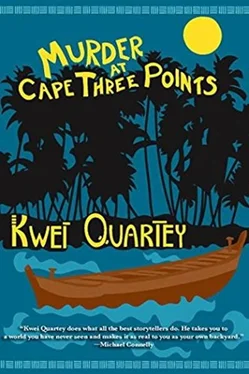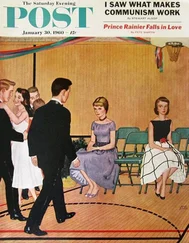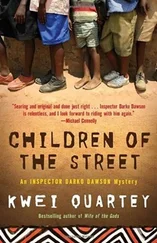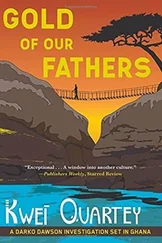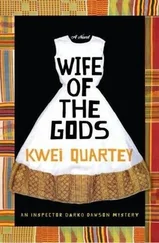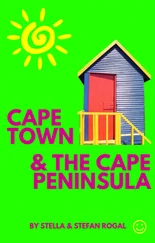“Let’s go home,” Dawson said. He didn’t like wet clothes.
THIRTY MINUTES AFTER Dawson was back in a dry outfit at the lodge, his phone vibrated. It was Chikata texting him to say he was coming over from the hotel. Dawson went to the kitchen, opened the door, and looked out. The sergeant was walking up in the pouring rain with a large unfurled red, yellow, and green umbrella.
“Where did you get that?” Dawson asked, as he came in.
“I borrowed it from the woman at the reception desk,” he said, folding it and leaning it against the wall. “I am now officially a Takoradian. Do you know I have never used an umbrella in my life?”
Dawson thought for a moment. “Now that you mention it, neither have I. People in Accra don’t know anything about them.”
They went to the sitting room.
“Yeah, Dawson,” Chikata said, sitting down with one leg swung over the arm of the chair. “I just talked to this Peter Duodo guy in Accra.”
“Oh, good,” Dawson said, brightening. “What did you find out?”
“In fact, I thought the man was going to cry over Smith-Aidoo.”
“What do you mean?”
“Very nice, soft-spoken gentleman. His voice started to shake. Seems like he’s still in grief. He and Smith-Aidoo grew up together in Takoradi and they had been friends since secondary school. Duodo moved to Accra about ten years ago for his real estate business, but he and Smith-Aidoo stayed in touch.”
“Aha,” Dawson said, nodding. “So they were close.”
“It seems so. When the oil discovery came along, Smith-Aidoo tried to persuade his friend to open an office in Takoradi and buy up some land along the coast while it was still cheap. He told Duodo that Malgam was looking to partner with someone for development in the Cape Three Points area and that Smith-Aidoo was negotiating with the chief of Akwidaa. Smith-Aidoo said he was going to see if he could cut Duodo into a deal. I asked Duodo if Smith-Aidoo would get a kickback in that case, but he denied it.”
“He probably wouldn’t admit it if it were true,” Dawson said, “but if it is, maybe someone at Malgam got wind of Smith-Aidoo’s dealings with Duodo and didn’t like it.”
“That isn’t all. Something else came up during my conversation regarding Cardiman. After the meeting, as he and his wife were leaving Ezile, Smith-Aidoo called Duodo to say that he had told Cardiman that if he didn’t voluntarily vacate the Ezile property, it would be easy to pay off Nana Ackah-Yensu to kick Cardiman out. Smith-Aidoo said that led to a heated discussion between him and Cardiman.”
Dawson sat forward with increasing excitement. “Cardiman didn’t say that at all. He said quite the opposite-that he had parted with Smith-Aidoo on good terms.”
“Doesn’t sound like good terms to me,” Chikata said, flatly. “Now listen to this: While he was on the phone with Duodo, Charles said that he and his wife were debating whether to drive up to the lighthouse. Cardiman had told them as they were leaving that the view of Cape Three Points was spectacular and that they must see it before they leave.”
“Now you’re talking.” Dawson exclaimed. “Because Cardiman told us it was about fifteen minutes from Ezile to the lighthouse.”
“Yes, that puts the time at twelve forty-five when the Smith-Aidoos get up to the lighthouse. They spend about twenty minutes looking at the view, or who knows, maybe they even go up in the lighthouse. It’s now five after one or a little later. Meanwhile, Cardiman has already left Ezile and-”
“Now he has enough time to lie in wait for them,” Dawson finished.
“Exactly.”
“Good job,” Dawson said. He slapped palms with his sergeant, ending it with the customary Ghanaian mutual snap of the fingers. “This means Cardiman is still a suspect, and he has some explaining to do.”
TUESDAY MORNING, THE SUN was hot and bright under a pale blue sky as Dawson and Chikata arrived at the Malgam office. A guard escorted them to the top floor, where the receptionist asked them to take a seat. The first-floor lobby was nice to look at, but this suite at the pinnacle of the building was spectacular. Geometrically placed Adinkra symbols, each with specific meanings, alternated with the Malgam logo patterned the gleaming wood floor. Overstuffed leather armchairs were set around the room with studied casualness. A skylight provided bright, airy illumination.
“Imagine what it’s like to be king of all this,” Chikata said under his breath, so that the receptionist couldn’t hear him.
Dawson grunted, but made no comment. He picked up a business magazine from the table and flicked through the pages with passing interest.
They looked up as a white man in a dark suit appeared from the hallway. Dressed in a crisp white shirt, navy tie, and dark blue slacks, he was short, late fifties, and expanding around the middle. His brown hair was thinning on the top and speckled with grey at his temples.
“Inspector Dawson?”
They stood up as the man came around the table with his hand extended.
“Good morning. I’m Roger Calmy-Rey. What a pleasure, Inspector. Jason Sarbah has told me about you. Good to have you here.”
“Thank you, sir. This is Detective Sergeant Chikata who is working with me on the case.”
“How do you do? Please, do come this way.”
They followed him to the right down the hallway to an automatic glass door that silently slid open as they approached. Beyond that, in a carpeted anteroom, an attractive, light-skinned woman sat in front of the computer on her shiny desk.
“Good morning,” she flashed a dazzling smile at them.
“Janice, please hold my calls while I’m meeting with Inspector Dawson, would you?” Calmy-Rey said.
“Of course, sir.” Her accent spoke of Ghanaian sophistication.
Calmy-Rey opened the last door, which was solid mahogany, and ushered him in. Dawson was sure he had never seen an office as large as this. In the foreground, a set of armchairs surrounded a coffee table. Calmy-Rey’s large polished desk was to the left, positioned at an angle. Beyond that was an executive meeting table with room for eight, a flat-screen TV on the wall facing a sectional black leather sofa, and farther still in the background another door. A floor-to-ceiling window offered a panorama of the city and the Atlantic Ocean.
“Do make yourselves comfortable,” Calmy-Rey said, gesturing to a couple of the armchairs. He couldn’t be more different from the tall, aloof man Dawson had pictured. He was friendly, and his voice was warm.
“Can I offer you anything to drink? A soft drink? Water?”
“Oh, no, we’re fine,” Dawson said. “Thank you, sir.”
Calmy-Rey took his seat in the facing chair, inclining himself not away, but toward them. Perhaps he had learned that with years of practice. Regardless, Dawson found it an appealing gesture that seemed genuine.
“I can’t tell you how glad I was when Jason told me you were here from Accra to help with the investigation into Charles’s death,” Calmy-Rey said. “It deeply and personally affected all of us at Malgam. Not only in Ghana. It had a strong ripple effect in our offices in London and all over the world where Malgam has activity. For me, Charles wasn’t simply an employee. I considered him a good friend, and so was Fiona.”
“Were you in Ghana when you heard the news of his death?” Dawson asked.
“No, I was on holiday in Crete. Once I heard what had happened, I flew into Accra the following day. It was important to give moral support at a time like that.”
“I’m sure that was appreciated,” Dawson said, wondering for a moment what life on Crete was like.
“It was my duty as CEO.”
Читать дальше
